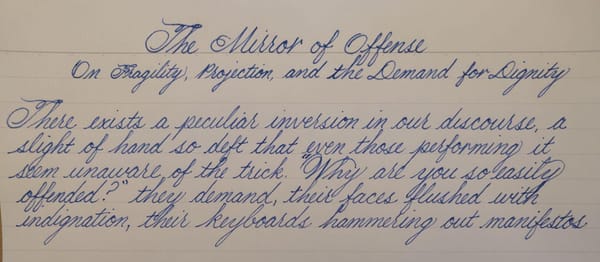When Your Child's Identity Becomes Your Inconvenient Truth
The Final Chapters

Well, folks, Ruby's back with the thrilling conclusion to their tragedy: "How I Discovered My Child Is A Whole Person With Agency And I'm Mad About It." Check it out, because parts 5 and 6 are where the mask really comes off.
Part 5: The Letter, or "My Child Tried to Communicate and I Made It About Me"
Ruby's child slipped a letter under their door before leaving for college. A letter. Under the door. In their own home. If that doesn't scream "I don't feel safe talking to you," I don't know what does.
The letter revealed that they'd been living under a different name online (you know, where people would actually use it), and that they'd attempted suicide after online conflict. The letter was signed "your daughter"
And Ruby's response? To violate their privacy by searching their room, where they found "fetish gear." Ruby immediately assumes the worst, autoerotic asphyxiation, because apparently trans people can't just own things without it being pathological.
Here's an inconvenient truth: When trans youth attempt suicide, it's rarely because they're trans. It's because they're unsupported, isolated, and desperate[1]. Ruby's child was literally telling them "I tried to kill myself because I'm so alone," and Ruby's takeaway was "must be the internet's fault."
Then comes the CAMHS appointment that sends Ruby into a tailspin. The clinician, doing their job, asks if the 17-year-old wants to transition and informs them of their rights. Ruby is "stunned." How dare a medical professional follow established guidelines for trans youth care[2]!
So Ruby pulls their child from the system. Because nothing says "I support you" like denying access to healthcare. They find a private therapist who tells them what they want to hear: that their child is "kicking it down the line." Translation: still trans, just not ready to fight their parents about it yet.
Part 6: The University Years, or "I Stalked My Adult Child Online and Didn't Like What I Found"
Ruby's daughter goes to university, escaping to a big city where they might actually find acceptance. They get an autism diagnosis, which Ruby somehow thinks will make them not trans. (Spoiler alert: autistic people are more likely to be gender diverse, not less[3].)
Then Ruby does what any reasonable parent would do: stalks their adult daughter's social media. And folks, they do not like what they find:
- Their child identifying as a trans lesbian
- Posts about being suicidal and lonely
- Evidence of self-harm
- Photos of estrogen vials
- Gasp Nude photos on their own blog
Ruby is "physically sick." Not because their child is suffering. Not because their daughter is self-harming. But because their child is trans and taking steps to address their dysphoria.
Let's talk about those estrogen vials. Ruby's daughter is self-medicating because their parents denied them proper healthcare. This is what happens when you block access to legitimate medical care, people find other ways[4]. It's more dangerous, yes; but for many trans people, it's less dangerous than continuing to live with untreated dysphoria[5]. As Ruby’s daughter has made painfully self evident to their Mom.
The Real Story Hidden in Plain Sight
Let me translate Ruby's narrative for you:
What Ruby says: "My child was happy until the trans cult got them."
What actually happened: Their child was masking their distress until they couldn't anymore.
What Ruby says: "Online communities corrupted my child."
What actually happened: Online communities were the only place their child found acceptance.
What Ruby says: "My child is destroying their body."
What actually happened: Their child is treating their gender dysphoria with medically recognized interventions[6].
What Ruby says: "I'm hurt that they lied to us."
What actually happened: Their child couldn't be honest because Ruby proved, repeatedly, that they weren't safe.
The Smoking Gun: Ruby's Own Words
In their follow-up posts, Ruby reveals the game. They ask their child: "Who are you? Are you [female name]? Or [male name]? I don't know who you are anymore."
Their child's response? "I'm me."
That's it. That's the whole thing. Their child is trying to exist as themselves, and Ruby can't handle it because it doesn't fit their narrow vision of who their child should be.
Ruby mentions making their daughter meditate daily (which the they correctly identifies as "bullshit" when forced). Ruby admits to reading their adult daughter's private blog. They hover while working from home, monitoring their child's screen time like they're still 12.
A Letter to Ruby's Child
Dear Daughter of Ruby,
I see you. We see you.
You're not crazy. You're not in a cult. You're not destroying your body. You're trying to survive in a world that includes parents who would rather have a dead son who fits their expectations than a living daughter who doesn't. Yes, many claim this is emotional blackmail, but in this case, it isn’t because you have already proven that for you, this is very much the struggle and choice you are faced with. So many have as well, you are not alone, you are not wrong.
Your desperation isn't because you're trans. It's because you're unsupported. Your self-harm isn't because of estrogen. It's because of isolation and rejection. Your suicidal ideation isn't from online communities. It's from having nowhere safe to be yourself, to live your real life, to be seen and loved simply for being.
The saddest part of your parent's story isn't that you're trans. It's that you had to slip a letter under a door to come out. It's that you had to lie about staying at university because you knew they'd interfere. It's that you're self-medicating because they denied you proper care.
You are not alone. There are people who will love you as you are, not as they wish you were. Daughter of Ruby, hear us when we tell you truly, it gets better. Take heart, have hope, many have trod the same path you are traversing, and it gets better.
The Ultimate Inconvenient Truth
Ruby asks how we can tell children they're "something they're not" and encourage them to "alter their bodies." Ruby, you are the one telling your child they're something they're not. You are the one trying to alter them; only you are trying to do it psychologically instead of physically.
Your daughter didn't get trapped in a cult, they're trapped in a family that refuses to see them. They're not escaping from reality, they're trying to escape TO reality, where they can finally exist fullly and freely as themselves.
Every major medical organization supports gender-affirming care because it saves lives[7]. But you know what doesn't save lives? Parents who stalk their children online, violate their privacy, deny them healthcare, and then write public blog posts misgendering them.
Your child's story does matter, Ruby, but not in the way you think. It's a cautionary tale about what happens when parents love their idea of their child more than their actual child.
The real tragedy here isn't that your child is trans. It's that they have a parent who would rather write a six-part public lament than spend that same time and effort in learning to simply understand and love them as they are.
Citations:
[1] James, S. E., Herman, J. L., Rankin, S., Keisling, M., Mottet, L., & Anafi, M. (2016). The Report of the 2015 U.S. Transgender Survey. National Center for Transgender Equality.
[2] World Professional Association for Transgender Health. (2022). Standards of Care for the Health of Transgender and Gender Diverse People, Version 8. International Journal of Transgender Health, 23(S1), S1-S259.
[3] Warrier, V., Greenberg, D. M., Weir, E., Buckingham, C., Smith, P., Lai, M. C., ... & Baron-Cohen, S. (2020). Elevated rates of autism, other neurodevelopmental and psychiatric diagnoses, and autistic traits in transgender and gender-diverse individuals. Nature Communications, 11(1), 3959.
[4] Mepham, N., Bouman, W. P., Arcelus, J., Hayter, M., & Wylie, K. R. (2014). People with gender dysphoria who self-prescribe cross-sex hormones: Prevalence, sources, and side effects knowledge. The Journal of Sexual Medicine, 11(12), 2995-3001.
[5] See [1] above.
[6] Coleman, E., Radix, A. E., Bouman, W. P., Brown, G. R., de Vries, A. L., Deutsch, M. B., ... & Arcelus, J. (2022). Standards of Care for the Health of Transgender and Gender Diverse People, Version 8. International Journal of Transgender Health, 23(S1), S1-S259.
[7] American Medical Association. (2019). AMA reinforces opposition to restrictions on transgender medical care [Press release]. https://www.ama-assn.org/press-center/press-releases/ama-reinforces-opposition-restrictions-transgender-medical-care
Jul 12, 2025


